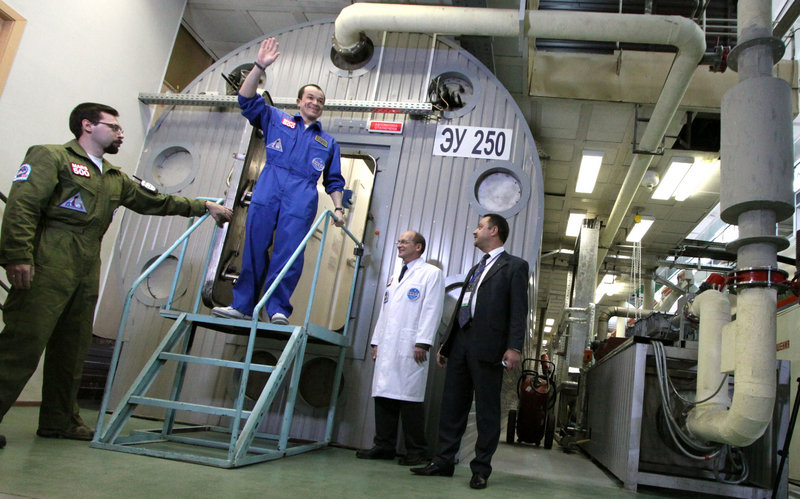WASHINGTON – Astronauts have a down-to-Earth problem that could be even worse on a long trip to Mars: They can’t get enough sleep. And over time, the lack of slumber can turn intrepid space travelers into drowsy couch potatoes, a new study shows.
In a novel experiment, six volunteers were confined in a cramped mock spaceship in Moscow to simulate a 17-month voyage. It made most of the would-be spacemen lethargic, much like birds and bears heading into winter, gearing up for hibernation.
The men went into a prolonged funk. Four had considerable trouble sleeping, with one having minor problems and the sixth mostly unaffected. Some had depression issues. Sometimes, a few of the men squirreled themselves away into the most private nooks they could find. They didn’t move much. They avoided crucial exercise.
“This looks like something you see in birds in the winter,” said lead author David Dinges, a sleep expert at the University of Pennsylvania School of Medicine.
The experiment was run and funded by Russian and European space agencies. A report on the simulation’s effect on the men was published online Monday in the journal Proceedings of the National Academy of Sciences.
Dinges said scientists can’t tell if the men’s lethargy was just lack of sleep or was also caused by other factors: the close quarters, lack of privacy with so many cameras or being away from their families for so long.
It’s a problem that has to be fixed before astronauts are sent to Mars, as President Obama proposes for the mid-2030s, Dinges said. The trip to Mars, Earth’s closest neighbor, would take about six months each way.
The world record for continuous time in space — 14 months — is held by Dr. Valery Polyakov, who was on the Russian space station Mir in 1994 and 1995. American astronaut Scott Kelly and Russian cosmonaut Mikhail Kornienko are scheduled to spend an entire year in space on the International Space Station, starting in 2015.
When leaving confinement in November 2011, the six volunteers — three Russians, a Frenchman, an Italian-Colombian and a Chinese — called their 520-day experience successful: “We can go forward and now plan to go to Mars and move confidently,” said volunteer Romain Charles of France.
The data scientists collected wasn’t as rosy. Devices on the volunteers’ wrists measured their movements and showed that when they were asleep and awake they were moving much less than they should have been, an unexpected and disturbing finding, Dinges said.
One of the six volunteers — who were paid $100,000 to live in the mock spaceship with limited and time-delayed contact with the outside world — slept nearly half an hour less each night than he did when he started the mission, affecting how he went about his day, Dinges said.
The loss of sleep matters because astronauts will have to perform intricate tasks on the way to Mars and while on the red planet. And they have to do vigorous exercises daily to fight the toll that near-zero gravity takes on the bones and other parts of the body. And most of the volunteers weren’t doing that.
Copy the Story Link
Send questions/comments to the editors.



Success. Please wait for the page to reload. If the page does not reload within 5 seconds, please refresh the page.
Enter your email and password to access comments.
Hi, to comment on stories you must . This profile is in addition to your subscription and website login.
Already have a commenting profile? .
Invalid username/password.
Please check your email to confirm and complete your registration.
Only subscribers are eligible to post comments. Please subscribe or login first for digital access. Here’s why.
Use the form below to reset your password. When you've submitted your account email, we will send an email with a reset code.